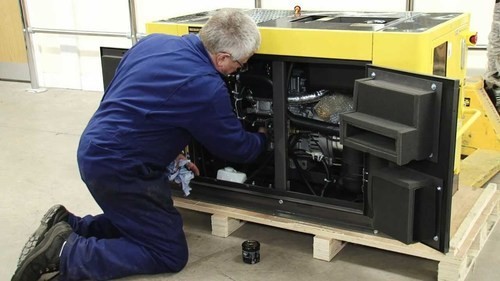Blackouts. Brownouts. Permanent flaws all these power interruptions have a devastating impact on households and businesses. They can waste valuable working hours and interfere with the equipment that keeps people safe during instances of extreme heat and cold. Worst of all, power outages might occur during industrial operations that rely on electricity. This is where diesel generators come into play.
Available Types of Industrial Generators
1. Portable Generator
Portable, gasoline or diesel generators can supply temporary electrical power. They are powerful enough to supply energy to television, freezer, and refrigerator.
Key features include:
- Combustion engine utilization
- Ability to connect to electrical appliances or tools
- Linkable into a facility’s subpanels
- Applicable in isolated locations
- Produces 60hz of electricity when the engine drives at 3600 rpm.
- Uses a governor to manage the engine’s speed
- Best replacement of power tools and lights
- Require low generator maintenance services
2. Inverter Generator
To generate alternating current (AC), an inverter generator employs an engine linked to an alternator. Unlike other industrial generators, it additionally employs a rectifier to convert AC electricity to DC power.
Key features include:
- High-tech magnets usage
- Utilization of Advanced electrical circuitry
- 3-Phase Electricity generation
- Outputs alternating current converts it to direct current, and then invert it back to alternating current
- Maintains a continuous current flow to an appliance
- More energy-efficient
- Adjustable as per required voltage and frequency
- Available in small and light measure
3. Backup Generator
A standby industrial generator is an electrical system that uses an automated transfer switch to power a device during a power outage.
Key features include:
- Automation
- Continuous power protection
- Two parts: a backup generator and an automated transfer switch
- Run-on either liquid propane or natural gas.
- Enriched with an internal combustion engine.
- Able to detect a power outage
- Performs automated weekly self-tests
- For use in safety systems
Why should you maintain your generator?
Many people envision building an industrial generator and then forget it until power loss. In truth, a standby generator, like any internal combustion engine, takes a little maintenance to work correctly. Regular generator maintenance services help the engine work more smoothly and allow you to recognize any possible problems as they arise.
The last thing you want to invest in is a backup generator, only to have it fail when you need it the most. That is why it is critical to maintaining your industrial generator. Regardless of how unimportant you believe maintenance is, a poorly maintained engine will not perform correctly. On the other hand, a generator may last anywhere from 20 to 30 years if properly maintained, keeping your house secure and comfortable during severe weather and power outages.
Generator Maintenance Services – Top 6 Tips To Put Into Practice Today!
1. Don’t Misunderstand Wattage Ratings
If you are purchasing an industrial generator based on its higher rating, then reconsider your choice. Though it looks on-demand product, it will only function for a short time. By the end of the day, your new industrial generator will be a molten mass of yard art, and you’ll be on the lookout for a replacement.
2. Ensure That You Have Enough Oil And Filters On Hand.
After only 25 hours, most new generators require their initial oil change. Therefore, bare it and refill it every 50 or 60 hours.
3. Running Out Of Gas Can Cost You High
Keep the tank full and remove the electrical load altogether before shutting off.
4. Your Worst Adversary Is Old Fuel.
The most common reason for diesel generators’ starting issues is stale gasoline. Manufacturers recommend putting a fuel stabilizer in the gas to reduce fuel breakdown, varnish, and gum accumulation. However, it is not a guarantee against issues. Try to use new, stable gas in your generator.
5. Always Close-Up Of Concrete Pier, Eyebolt And Grounding Rod
Connect the ground wire to the grounding rod for safety and the chain to the eyebolt for security. The usual suspects are lousy gasoline, a corroded or plugged carburettor, or a bad ignition coil when a small engine doesn’t start.
6. Use A Heavy-Duty Cord
Generators are loud, so most people park them as far away from the house as possible. (Be considerate of your neighbors, though.) That’s OK as long as you use heavy-duty 12-gauge cords and limit the run to 100 ft. Lighter cords or longer runs mean more voltage drop. And decreased voltage can cause premature appliance motor burnout.
Additional Industrial Generator Care & Maintenance
Aside from the basic practices listed above, it is also critical to exorcise the generator every week for 30 minutes under load. It will charge the battery, remove excess moisture from the engine, lube it, and filter the gasoline and foil. Firmly insert loose components detected on the generator.
You should also retain inspection and test records for future inspections and examinations. This data will keep you up to date on the status of your generator while acquiring generator maintenance services.




